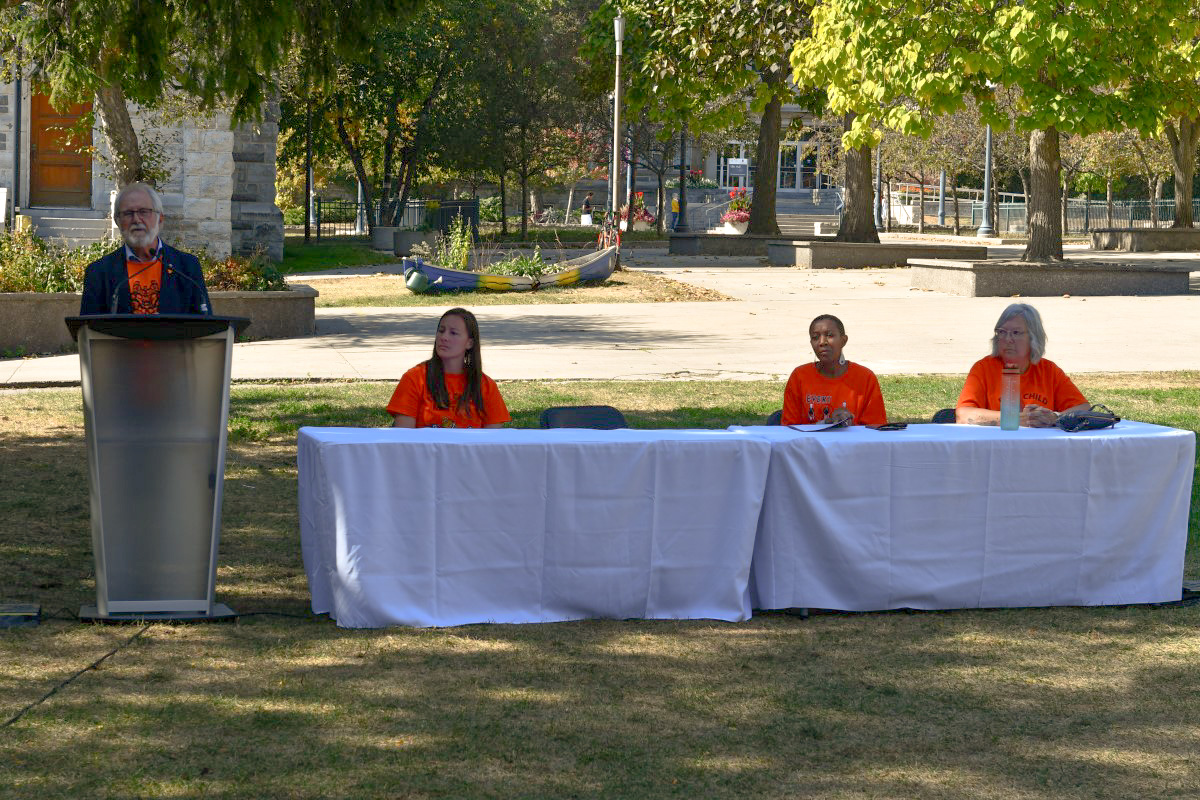With all academic activity suspended on Oct. 2 to observe the National Day for Truth and Reconciliation, nearly 400 Queen’s community members dressed in orange shirts gathered at the heart of campus to honor survivors and Indigenous communities persecuted and harmed by Canada’s residential school system.
Assembled before a sacred fire on Agnes Benedickson Field, attendees were guided by event emcee Kandice Baptiste, Senior Director of Student Inclusion, Equity, and Belonging, through a period of thoughtful reflection, ceremony, and remarks by university and Indigenous leaders.
“We must sit in the discomfort in knowing that the residential school system existed and was operated by settlers on this land, and that the harms they committed left generations of Indigenous families and communities to pick up the pieces,” Baptiste said during her opening remarks. “Each Indigenous community, and person, is left to process what might have been. That is what today is about for me and many of us, sitting in the grief about what might have been, how many more of us there should be, and what was stolen. It’s also an important moment to acknowledge that despite all of that, my ancestors—past, present, and future—will continue our ways of knowing and being, with love in their hearts, so that we can continue to exist well into the future. That is what we are going to do today with this fire.”
Principal and Vice-Chancellor Patrick Deane spoke next, underscoring the necessity for education to be a powerful and positive source for good, and emphasizing that it is the individual responsibility of everyone in Canada, particularly non-Indigenous people, to act toward advancing reconciliation.
“It is shocking to reflect on education as a process meant to cultivate the potential of young people, to prepare them for adult life, and to lay the grounds of a just and equitable society, and to understand how Canada’s residential school system subverted that, turning it into a force of destruction,” said Patrick Deane, Principal and Vice-Chancellor. “One hopes that with every year we commemorate those children lost and reflect on the ongoing damage done to their families and communities, that we will be increasingly coherent, thoughtful, and passionate in our resolve to bring healing to our country.”
The event also represented a moment for the campus community to reaffirm the university’s commitment to building an inclusive community, advancing truth and reconciliation, and integrating Indigenous ways of knowing and being into the fabric and life of the university.
“Honouring the truth requires intention and action in support of justice for, and reconciliation with, Indigenous communities,” said Stephanie Simpson, Vice-President (Culture, Equity, and Inclusion). “We must support the resurgence of Indigenous communities, practices, and languages throughout Turtle Island, and here at Queen’s, in practical and meaningful ways. As a university community we will strive to ensure that Indigenous learners, scholars, and staff have the resources they need to thrive; to support ongoing work to incorporate Indigenous pedagogies into the curriculum; and to ensure that every student graduates with an appreciation for Indigenous ways of knowing and our responsibilities as Treaty people.”
Betty Carr-Braint, Knowledge Keeper from Tyendinaga and Staff Elder with Queen’s Four Direction Indigenous Student Centre closed out the official remarks.
“Reconciliation is not easily defined. It’s not linear and does not have a clear end point. It’s a continuous process that leads to improved outcomes for Indigenous people and communities,” said Carr-Braint, quoting the Downie Wenjack Fund’s #DoSomething campaign, adding: “It’s not one day, it’s every day.”
“I’m proud of Indigenous peoples and the work we’ve done; that we’re resilient and we’re picking up our responsibilities—living our culture and reclaiming our languages,” she continued, speaking directly to Indigenous community members. “I know we have to keep on telling the truth.”

Scared fire closes out week of activities
The sacred fire marked the end of a week of educational, ceremonial, and collaborative activities honouring the National Day for Truth and Reconciliation, as organized by the National Day for Truth and Reconciliation Working Group, as well as cross-campus faculty, staff, and student groups.
Just days after the official opening of a new Indigenous gathering space on campus, Queen’s opened a week of National Day for Truth and Reconciliation activities with the raising of the Survivors and Every Child Matters flags in front of Richardson Hall.
Working with the university, the student-led Tricolour Outlet collaborated with local Cree artist Jaylene Cardinal to design an orange t-shirt. They sold 460 t-shirts, with proceeds donated to the Orange Shirt Society. Varsity athletes also donned specially designed jerseys during a September 30 game recognizing the day.
"This year, we introduced several days of Truth and Reconciliation-focused booths on West and Main campuses to increase awareness and engagement with this important national recognition day," says Khadija Farooq, Social Issues Commissioner with the AMS's Social Issues Commission (SIC). "We reached out to students with educational activities, social media discussion, and giveaways, and promoted the broader Indigenous initiatives happening on campus thought the year. The work of reconciliation is crucial and ongoing, and SIC is committed to advancing Indigenization, equity, diversity and inclusion through programs like our reconciliation-focused Productive Pastimes: Equity-Centered Book Club program."
Members of the Queen’s community attended two film screening at The Isabel, joining in facilitated discussions about films Beans and Indian Horse, and the Fireplace Reading Room at Stauffer Library hosted an art show featuring art by local Indigenous artists.
The university also highlighted important Queen’s research being done in collaboration with Indigenous communities and announced six new positions for Indigenous scholars selected for recruitment through the Queen’s National Scholars Program.
Throughout the week, the university encouraged community members to make use of its existing support services available through Four Directions Indigenous Student Centre, the Office of Indigenous Initiatives, Student Wellness Services, and the Employee and Family Assistance Program.
Originally published in the Queen's Gazette.